

Ancient Greeks History School Workshop
We will set the scene by rolling out our lengthy living timeline creating a brilliant hands-on opportunity to establish a better chronological understanding of what was going on before, during and after the Ancient Greeks.
There are a dazzling number of ideas and inventions we can thank the Greeks for. Our Greek workshop goes thousands of years into the past. From the Bronze Age we meet an elite Hoplite warrior and their specialist weaponry and exquisite armour. Equally impressive were the regular foot soldiers who were well trained, well equipped and rather incredibly fighting in sandals.
Hands on History can work with just one class all day, or up to four classes in a year group. Each class will be kept busy and entertained all day by us! If you book a history school workshop with us, two members of the Hands on History team will come to facilitate.
Please see below examples of 4 itineraries (for 1, 2, 3 or 4 classes). Please note that these itineraries are samples – we can be flexible with timings and content may change.
Itinerary 1
Itinerary 2
Itinerary 3
Itinerary 4
Interactive learning for KS1, KS2 and KS3

Ancient Greece was full of great thinkers, poets, scientists, mathematicians and a dazzling array of deities with Zeus at the top of the Senior Management Team on Mount Olympus.
Our glorious Greeks day allows hands on experience with ancient artefacts from temples, households and ancients schools; an opportunity for everyone to dress in the height of Athenian military fashion and plenty of time to explore and handle the arms and armour of the Greeks very closely.
By the end of the school day, you will also have explored some of the more famous Greek gods, you might offer up a prayer to the titan god Coeus the god of intelligence and farsight- he might give you some help with your homework.
Unique Educational Resources
Democracy and marvellous maths were just two elements of the Greeks’ remarkable legacy. We really enjoy introducing schools to our Ancient Greek Doctors’ surgery.
There is no need to make an appointment, with Greek technology and first class medical knowledge about the four humours we can quickly diagnose and cure just about anything. We can even deal with unfortunate injuries with some very efficient surgical amputation- an extremely popular option with the children for obvious reasons.
“Overall it’s been brilliant! A great success!”
– Teacher, Brighton Dec 20
Book your Workshop
Would you like to find out more about our Ancient Greeks History Workshop for Schools? Please get in touch with our team or book your workshop via the button below.
The price of our workshops are £675 + VAT (plus travel @ .50p per mile + VAT) for a full school day. We often travel to schools across East Sussex and parts of West Sussex, Surrey and Kent.
Download Brochure
Book a workshop, delivery & returns shop terms & conditions events & school workshops terms & conditions privacy policy.
- International
- Education Jobs
- Schools directory
- Resources Education Jobs Schools directory News Search

KS2 Ancient Greece Unit - 7 Outstanding History Lessons
Subject: History
Age range: 7-11
Resource type: Unit of work
Last updated
13 August 2024
- Share through email
- Share through twitter
- Share through linkedin
- Share through facebook
- Share through pinterest

Discover the richness of Ancient Greece with our well-structured KS2 History Unit. This unit comprises seven insightful lessons covering a range of topics from Greek mythology to historical inventions. Each lesson offers a blend of interactive activities and thoughtful discussions, providing students with a solid grasp of different aspects of life in Ancient Greece. Included are all lesson plans, PowerPoints and resources needed for each lesson.
Lesson 2: Exploring Greek Gods and Mythology This lesson delves into the world of Greek mythology, introducing students to the gods, their roles, and relationships through engaging activities such as “Guess the Gods.”
Lesson 3: Perseus and the Gorgon’s Head: A Poetic Tale Experience the art of poetry while immersing in the tale of Perseus and the Gorgon’s head. Students perform and analyze the story to enhance their language skills and comprehension.
Lesson 4: Greek Temples: Design and Architecture Gain insights into the architecture of ancient Greek temples. Explore key features and even design a temple, fostering an understanding of Greek architectural concepts.
Lesson 5: Athens vs. Sparta: Comparing Two City-States Compare Athens and Sparta, two significant Greek city-states, to comprehend their differences in governance, culture, and lifestyle.
Lesson 6: Ancient Greek Olympics: Athletic Excellence and Beyond Explore the ancient Greek Olympics, discovering the sports, participants, and prizes, while understanding the historical importance of this event.
Lesson 7: Greek Inventions: Shaping the Modern World Uncover the ingenuity of ancient Greek inventions and their influence on contemporary life. Engage in activities like the “Ancient Greek Dragons’ Den” to creatively present their impact.
Our KS2 Ancient Greece History Unit offers a comprehensive exploration of this captivating civilization. Each lesson thoughtfully combines discussions, interactive activities, and presentations, fostering a solid understanding of Ancient Greek culture.
Tags: Key Stage 2, History, Ancient Greece, Greek Mythology, Architecture, City-States, Olympics, Inventions, Interactive Lessons, Comprehensive Learning, Cultural Exploration.
Have any issues with this resource or a request? Contact us directly for the quickest response at: [email protected]
KS2 History year 3 year 4 year 5 year 6 knowledge skills lks2 uks2 ks3
Tes paid licence How can I reuse this?
Your rating is required to reflect your happiness.
It's good to leave some feedback.
Something went wrong, please try again later.
This resource hasn't been reviewed yet
To ensure quality for our reviews, only customers who have purchased this resource can review it
Report this resource to let us know if it violates our terms and conditions. Our customer service team will review your report and will be in touch.
Not quite what you were looking for? Search by keyword to find the right resource:
For availability or booking - call now on 0800 112 3192

Exciting, immersive, and inspiring history workshops for schools, presented by our charismatic teams of historians.
Hands-on, educational workshops.
We typically visit more than 1,700 schools a year throughout the UK, to deliver hands-on, educational workshops that leave kids (and teachers) buzzing.
Inspiring historians
Our unrivalled pool of talented historians, archaeologists, and reenactors have a deep-rooted passion for their subjects. True specialists in their field, our teams love nothing more than sharing their knowledge and inspiring the next generation of history buffs.
As seen on film and TV
Our Time Travellers are very much in demand for their depth of knowledge and enthusiasm for their subject. They regularly take part in historical re-enactments, and have appeared in many films, historical documentaries and on the BBC’s “Horrible Histories”.
KS2 Britain – Stone Age to the Iron Age
From the original hunter gathers to early farming communities, ancient technology and coming of the age of metal.
KS2 Ancient Greeks
Covering everything from the warring city states, the birth of democracy and Greek legends to Alexander the Great and Greek culture.
Travel back 1000 years and unearth the undiscovered world of the Maya.
KS2 Ancient Egyptians
This fun, absorbing and interactive workshop introduces children to the fascinating and enigmatic world of the ancient Egyptians.
This engaging and motivating day studies life in Britain under the Pax Romana, the long period of relative peacefulness experienced by the Roman Empire.
Experience Saxon England, from the hierarchy and etiquette of the Lord’s Hall, the language and the story of Beowulf, through to the burial of a Saxon king.
KS2 Vikings
This hugely popular Viking workshop covers everything from home-life to battles, Gods and how to have fun, Viking-style.
KS2 Medieval
This entertaining one-day workshop provides insight into medieval life from 1066 to 1483.
The day starts with a short talk start on how and why the Tudors came to power, the effects of religious turmoil and how the discovery of the New World changed Europe.
KS2 World War One
This educational, exciting and moving workshop provides a depth of understanding of the Great War in an impactful, but sensitive and age-appropriate manner.
KS2 World War Two
A captivating workshop that vividly brings World War II to life, using a variety of teaching aids (including a genuine air raid siren!).
KS3 The Great War for Secondary Schools
This workshop provides students with a detailed insight into the life of a common soldier during the First World War, and addresses the myths of the “Great War”.
The day was fantastic, perfect content, extremely efficiently run. Lauren was brilliant with the children and kept their interest + enthusiasm up all day. Thank you
Our children had a wonderful day there were plenty of activities to enjoy throughout, that were hands on and engaging. a really enjoyable day., our children all had a fabulous learning filled day. they were buzzing with excitement and so engaged in all the interactions. thanks for helping to bring the past to life for our classes, another successful workshop from portals. i am so grateful for such a brilliant experience. the children were engaged all day and thoroughly enjoyed the day. thank you, a very knowledgeable and passionate leader, who engaged well with staff and children. thanks you.

Study at Cambridge
About the university, research at cambridge.
- Undergraduate courses
- Events and open days
- Fees and finance
- Postgraduate courses
- How to apply
- Postgraduate events
- Fees and funding
- International students
- Continuing education
- Executive and professional education
- Courses in education
- How the University and Colleges work
- Term dates and calendars
- Visiting the University
- Annual reports
- Equality and diversity
- A global university
- Public engagement
- Give to Cambridge
- For Cambridge students
- For our researchers
- Business and enterprise
- Colleges & departments
- Email & phone search
- Museums & collections
- Things To Do
- Things to Do at Home
- Faculty of Classics
- The Faculty overview
- The Caucuses
- University and College Teaching Staff
- Research Staff
- Affiliated Lecturers
- Visiting scholars and students
- Supporting the Faculty overview
- Support Classics outreach for young people
- Support Studentships
- Endow Academic posts
- Create a new Postgraduate Centre
- Equality and Diversity overview
- Race Equality Statement
- Athena SWAN
- Harassment and Discrimination: Advice and Reporting
- Equality and Diversity Committee
- Faculty & College Officers
- Environmental guidance statement
- Faculty Newsletter
- Postgraduate Students
- Cambridge Greek Play overview
- Cambridge Greek Play 2022- Student Blog
- Faculty Committee meetings calendar
- How to get to the Faculty of Classics
- Professional Services Staff
- Research overview
- Research Projects overview
- Contexts of and Relations between Early Writing Systems (CREWS) overview
- CREWS - Project Members
- PhD Studentship on the Early Greek Alphabet
- CREWS Studentship Application Guidance
- The Impact of the Ancient City overview
- Project Members
- Beneath the surface of Roman Republican cities overview
- Roman York Beneath The Streets
- Greek Epic of the Roman Empire: A Cultural History
- Greek in Italy overview
- Greek in Italy - Project Members
- Interamna Lirenas Project overview
- The excavation of the theatre
- The inscribed sundial
- Roman Colonial Landscapes (archived) overview
- 2010 Report overview
- Geophysical Prospections (2010)
- Recording of Standing Archaeological Remains (2010)
- Field Survey (2010)
- Analysis and Study of Archaeological Materials (2010)
- 2011 Report overview
- Field Survey (2011)
- Geophysical Prospections (2011)
- Analysis and Study of Archaeological Materials (2011)
- 2012 Report overview
- Geophysical Prospections (2012)
- Field Survey (2012)
- Analysis and Study of Archaeological Materials (2012)
- Publications
- Lerna: The Analysis, Interpretation and Publication of the Middle Bronze Age Phase
- Cambridge Greek Lexicon overview
- Introduction to the Lexicon
- Lexicon: History and Personnel
- Methodology and Future Use
- Funding the Lexicon
- Slips: Textual Citations
- Tagging the Lexicon
- Research Partnerships
- Lexicographic Resources
- Thomas Hardy, 'Liddell and Scott'
- Mycenaean Epigraphy Group overview
- Research and Archival Collections overview
- The Ventris-Chadwick Correspondence
- Decipherment overview
- The Life of Michael Ventris
- The Life of John Chadwick
- Members/Contact
- Links and Resources
- Herculaneum Conservation Project
- Aldborough Roman Town Project
- Moral Psychology, Ancient and Modern
- Classics Beyond Borders
- Visual Interactions in Early Writing Systems (VIEWS) overview
- Visiting Fellowship Competition
- West Area of Samos Archaeological Project (WASAP)
- Modes of Reading and the Transmission of Texts in Antiquity
- Postdoctoral Research Funding
- Research data, ethics and data protection
- Cambridge Classical Studies
- Cambridge Classical Journal
- Prospective Students overview
- Undergraduate study overview
- Four-year course
- Three-year course
- Why Classics matters
- Course structure
- How we teach
- What students say
- Open days and events
- Summer schools
- Frequently asked questions
- Undergraduate Funding
- Offer Holders
- Postgraduate study overview
- MPhil in Classics overview
- PhD in Classics overview
- VIEWS PhD studentship
- How to Apply
- Postgraduate funding overview
- Student Profiles
- Postgraduate Open Day - Sat 19 Nov
- Placement Record
- PGCE in Classics
- Greek Art & Archaeology in the Faculty of Classics
- Affiliated students
- Teachers and Schools
- Student Information overview
- Undergraduate Students overview
- Equality, Diversity and Inclusion
- Prelim to Part IA (four year degree only) overview
- Paper 1: Latin Texts and Paper 2: Latin and Greek Language
- Paper 3: Classical Topics and Paper 4: Literary Essay
- Introduction to Greek language
- Part IA overview
- Papers 1-5: Greek and Latin Language and Classical Texts
- Paper 6: Classical Essays
- Papers 7-8: Translation into Greek and Latin prose and verse
- Part IB overview
- Schedules A-B
- Part II overview
- Group A: Greek and Latin Literature
- Group B: Greek and Roman Philosophy
- Group C: Ancient History
- Group D: Classical Art and Archaeology
- Group E: Classical and Comparative Philology and Lingustics
- Group X: Interdisciplinary Studies
- General Courses
- Optional (O) Papers
- Classics in other Triposes
- Transferable skills
- After your degree
- Postgraduate Students overview
- Postgraduate Training
- MPhil and PhD Handbooks
- Advice on plagiarism
- Travel awards
- Student-Staff Joint Committee overview
- Museum overview
- Visit us overview
- Covid Reopening FAQs overview
- Getting to the Museum of Classical Archaeology
- Museum Access
- Museum Facilities & General Information
- Group Bookings
- Things To Do overview
- Museum Events overview
- Past Museum Events overview
- Past Events: 2024
- Past events: 2023
- Past Events: 2021
- Past Events: 2020
- Past Events: 2019
- Family Activities
- Things to Do at Home overview
- Ancient Romans Learning Resources
- Ancient Greeks Learning Resources
- Colouring Sheets
- In Conversation With overview
- Mary Beard and Aphrodite
- Oedipus (aka Rosy Sida) and the Nike of Samothrace
- Issam Kourbaj and the Children of Niobe
- Lyn Bailey and the Dying Gaul
- Sade Ojelade and Laocoon
- Katharine Russell and the Terme Boxer
- Classics Undergrads and Kouroi
- Emlyn and Farnese Hercules
- Michael Bywater and Meleager
- MOCA Specials overview
- MOCA Specials - Accessible text
- Learn Latin with MOCA
- Summer with the Museums 2021
- Museum Exhibitions overview
- Previous Exhibitions
- Previous Temporary Displays
- Online exhibitions
- Collections overview
- Museum Highlights overview
- Sounion Kouros
- Temple of Zeus at Olympia - Pediments
- Farnese Hercules
- Highlights Pack
- Collections: Watch, Listen & Read overview
- Peplos Kore
- Bronzing the Terme Boxer
- Ask a Cambridge Expert: The Romans
- Artist: Unknown, The Head of Apollo from Halikarnassos
- The Bean Archive overview
- George E. Bean overview
- Life and Times
- Tales of George
- Highlights overview
- George's Donkeys
- The Archaeological Guides
- Cast Collection
- Research Catalogues
- Picture Permissions overview
- Commercial Licences: Terms and Conditions
- Schools overview
- School Trips overview
- Primary overview
- Key Stage 2: Ancient Greeks (In Person)
- Key Stage 2 Romans (In Person)
- Key Stage 2: Virtual Visits
- Secondary & A-level overview
- Key Stages 3-5: Museum Tours (In Person)
- Key Stages 3-5: Virtual Visits
- Art and Drawing Groups
- Group Visits: Online Booking Form
- Research and Teaching overview
- Research Enquiries
- Research Visits
- About us overview
- Museum History
- Meet the Museum Staff
- Join our Mailing List overview
- Family Newsletter Archive
- Events & Exhibitions Newsletter Archive
- Schools Newsletter Archive
- Museum News overview
- 17.3.2020 Coronavirus Update: Temporary Closure of MOCA
- 10.8.17 Closure for installation of a new carpet
- 3.11.16 Aphrodite goes to Greenwich
- 1.5.15 MOCA nominated for Family Friendly Award
- 17.4.15 London Maori Club welcomes Marian Maguire's The Labours of Herakles to Cambridge
- Copyright Notice & Take Down Policy
- Frequently Asked Questions
- Web Accessibility Statement
- Support us overview
- Volunteer overview
- Bridging Binaries Volunteer Tour Guide
- Summer Work Experience Placements (Two Weeks)
- Events Volunteer Register
- Library & Archives overview
- About the Archives overview
- Launch of the Faculty of Classics portal on the Cambridge Digital Library
- Tales from the Archives No. 1, December 2023
- Library Borrowing and Visiting
- Library Collections overview
- Book or Journal Suggestions
- Services overview
- Computing and WiFi
- Printing, Scanning and Copying
- Ask a librarian
- Find Us / Contact Us
- Seminars overview
- Cambridge Philological Society and CCJ overview
- Membership and subscriptions
- CCJ - information for contributors
- Back numbers of CCJ/PCPhS
- Supplements to CCJ
- Membership form (doc)
- Membership form (pdf)
- GDPR Statement
- Classical Equalities Lecture 2024
- In Conversation With
- MOCA Specials
- Museum Events
Learn about Ancient Greeks with the Museum of Classical Archaeology
The Museum of Classical Archaeology loves helping children and adults to learn about the Ancient Greeks. We have put together a range of activities aimed at primary school children. They are easily adaptable to other ages too.
The following home learning resources are available on this page:
- Paint with us: Selene, Goddess of the Moon
- Write a Greek Myth
- Bassae Frieze
- Medusa Mask
- Tombstone of Hegeso
- Visit the Museum: KS2 Greeks Pack
- Design your own Greek Vase
- Hero Hybrid
Have you used any of these resources? Please tell us what you thought about them in this very short survey. It should take you no longer than 5 minutes. Thank you for your help!
1. Selene Goddess of the Moon
Selenethumb.png.

In Greek mythology, Selene is the sister of Helios, the god of the sun. The Romans called her Luna. She drives her moon chariot across the heavens. In the statue in the Museum of Classical Archaeology, she is riding a horse into battle with the Giants.
Learn more about Selene and follow our how to guide on colouring the goddess's dress to look like the moon!
You will need:
- paintbrushes,
- something glittery
- Download the drawing of Selene to get started.
- Watch the video with instructions or download the written instructions here.
2. Write a Greek Myth
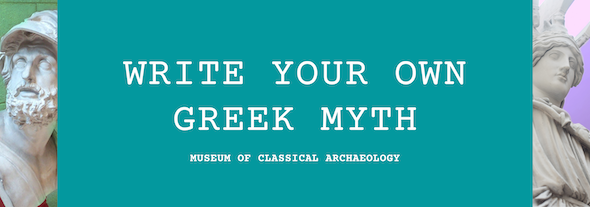
Follow our handy instructions and write your own greek myth with heroes, villains, gods and monsters. You can choose between four story types: a quest, homecoming, foundation and monster, illustrated with examples from Greek myth and statues from the gallery throughout.
- paper and pens.
- the instructions, which you can download below
Download Write you own Greek Myth Activity (pdf).
Why not use some colouring pencils to add illustrations to your myth?
3. Bassae Frieze
Every Monday throughout December a new children’s activity will be uploaded to the website! The Activities will circle around our Bassae Frieze Conservation project . These are perfect for entertaining kids throughout the winter break. Get ready for colouring sheets, making activities and story-writing resources!
Making Activity
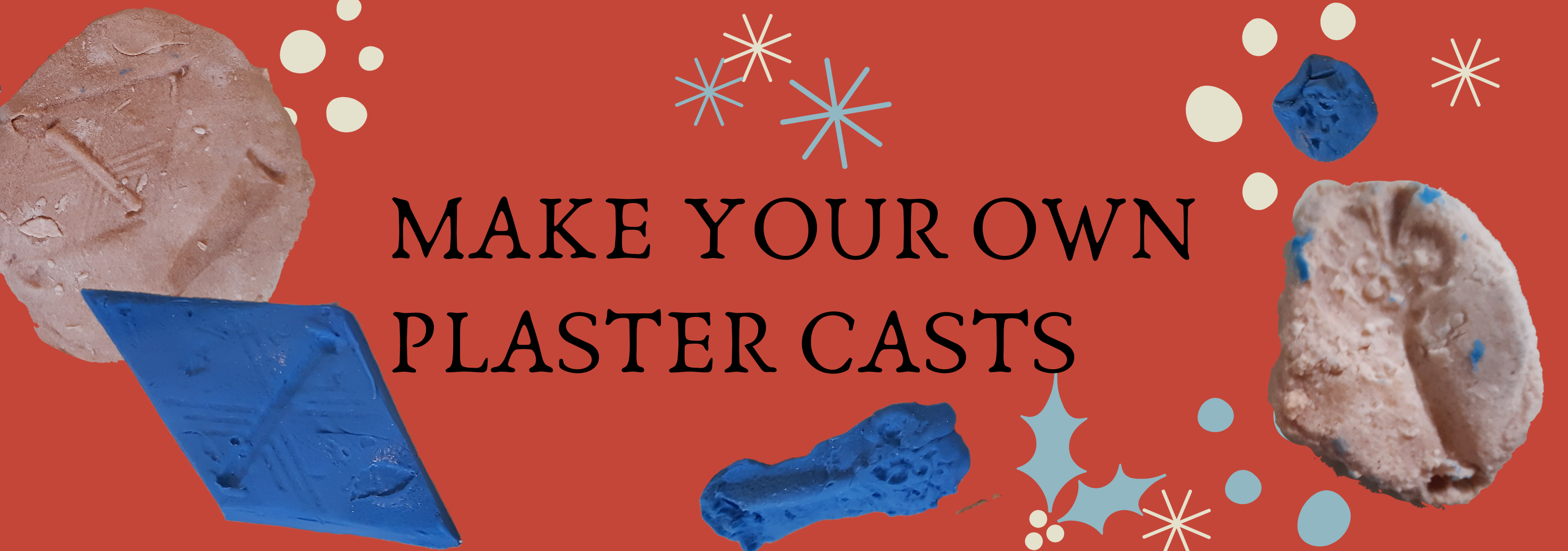
All of our statues are plaster copies of other statues. The process of making them is called plaster casting. In this activity you can make your own moulds and casts using salt dough, plasticine and household objects. This is quite a long activity, best saved for a long winter weekend.
- Make your own plaster casts: activity guide (pdf)
- Make Your Own Plaster Casts: Accessible PDF
You will need:
- Objects you want to cast
- baking sheet
- baking paper
- cup of flour
- half a cup of salt
- half a cup of water
- plasticine or play-dough
Colouring Activities
In this colouring sheet we erased the horse between two fighting figures. Let your imagination fly and draw the horse back in!
- Download the draw a horse activity (jpg)
Why not give colouring this chariot from the Bassae Frieze a go? These would very likely be painted in the ancient times. Let your imagination run wild. The chariot, and the faces of the figures are badly damaged. Why not try to redraw them?
- Download the chariot colouring sheet (jpg)
The Colouring sheet is based on this cast of the chariot of the Bassae Frieze:
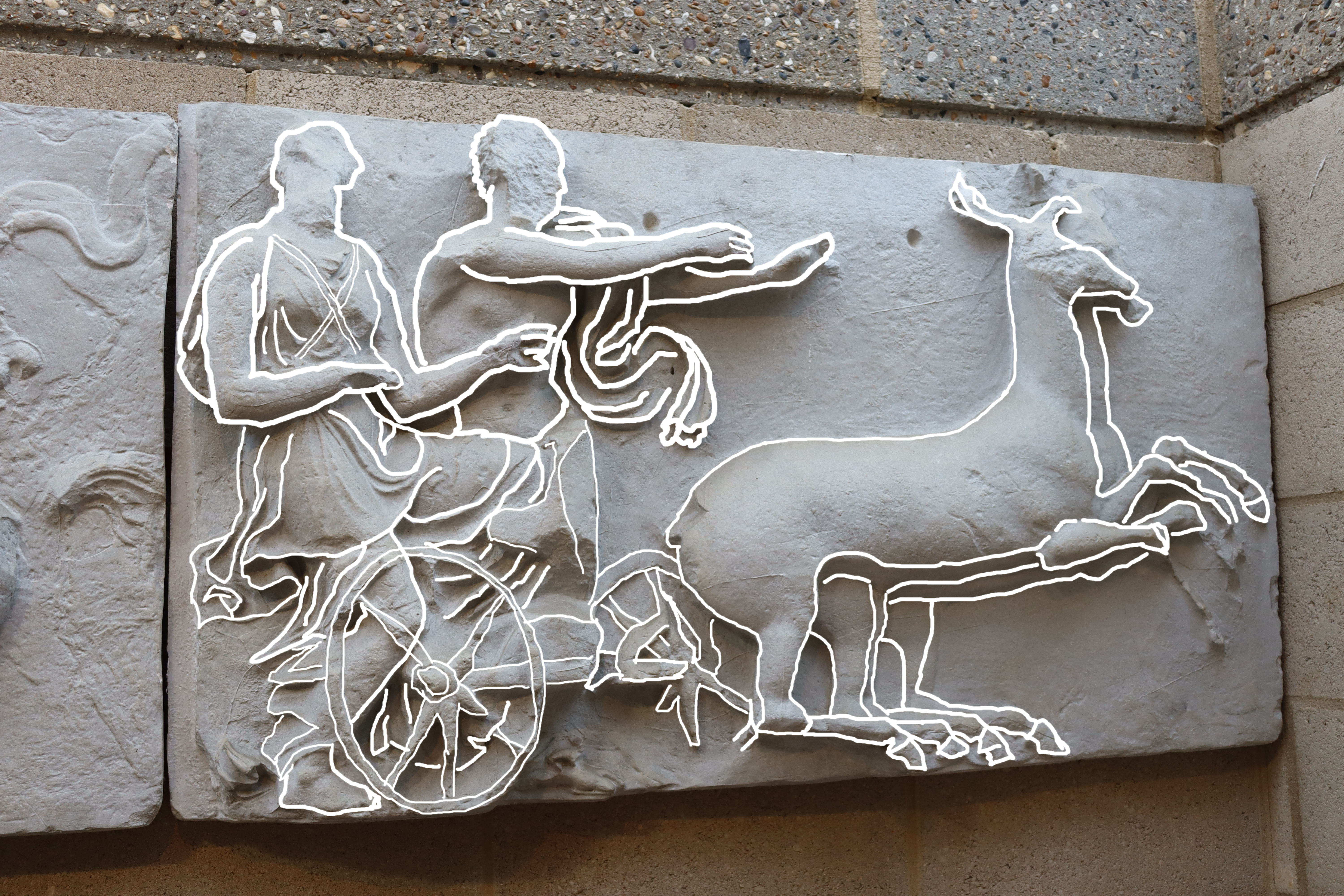
4. Medusa Mask

Make your own mask with snakes instead of hair. Based on the story and our own sculpture of Medusa, follow this simple step by step tutorial to make your own fun mask. If you need an idea for an arts and crafts afternoon, this is perfect.
Wear it around the house and scare your family!
- Medusa Mask Activity (pdf)
- Medusa Mask Activity (accessible pdf)
5. Tombstone of Hegeso
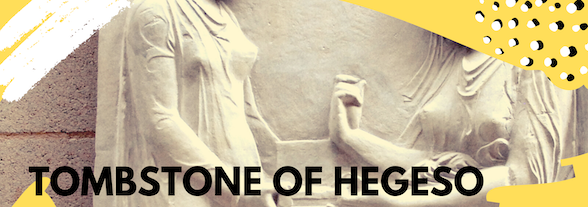
You will need the following
- our online resource (click below to download the pdf).
- paper and pencil or pen to complete the activity
- Tombstone of Hegeso Resource (pdf)
- Tombstone of Hegeso Resource (Accessible pdf).
6. Visit the Museum: KS2 Greeks Pack
We know it isn't always possible to visit our Cast Gallery. That's why we made these downloadable home learning packs. You can explore our Museum from afar - with no need to venture out of the house!
Learning about the Ancient Greeks is easy.
- Our online resources: click below to download the pdf version
- Some paper and a pencil to write down your answers
Using our KS2 Ancient Greek resources, you can explore the following Greek Sculpture topics:
Colour, Gods and Goddesses
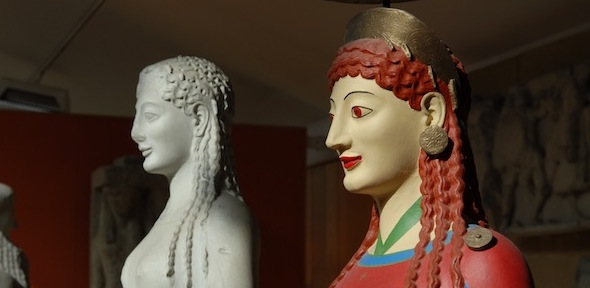
- Be amazed by our colourful painted Peplos Kore and think about the effects of paint.
- Meet some of the Greek Gods and Goddesses - and learn how to tell them apart.
Download: KS2 Ancient Greeks Online Resource: Colour and Gods (pdf)
- Find out more about ancient athletics - and how competitive the Greeks were.
Download: KS2 Ancient Greeks Online Resource: Athletes
Fights and Hercules
- Talking of competition, find out more about war and how much the Greeks liked to fight
- Learn about the famous hero, Hercules (or, as the Greeks called him, Herakles)
Download: KS2 Ancient Greeks Online Resource: Fights and Hercules (pdf)
7. Design Your Own Greek Vase

Learn more about Greek Pottery! Use vase templates and sherds from our collection to design your own vase.
In this activity you will chose one of three pottery shapes. Next, you will draw and decorate your own inspired by Greek pottery styles.
- paper, pencils, coloured pens or pencils.
- our online resources, click below to download them
Step 1: Choose the shape of your pot!
The shapes of greek pottery tell us about their function. In this worksheet you can learn about three pottery shapes and what they were used for. To be ready for the next activity, choose your favourite and either print it off or draw it on a piece of paper.
Download: Greek Vase Shapes Template (pdf)
Step 2: Design and Draw
Download our guide to Greek Pottery and use it as inspiration to decorate the pot you have chosen. Share your designs with us!
Download: Greek Pottery Sherds Guide (pdf)
8. Hero Hybrid
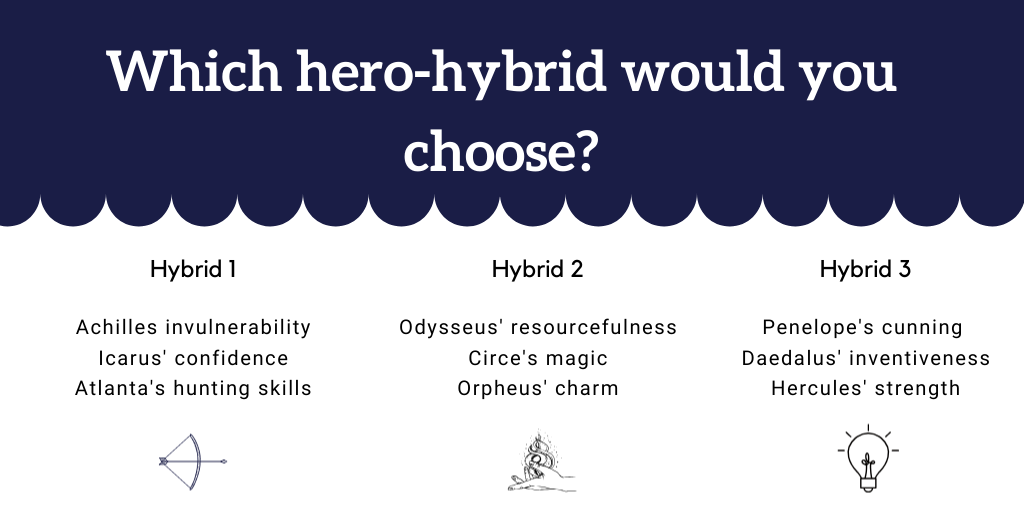
Ancient heroes came in all shapes and sizes. In this activity you will make your own hero inspired by our collection!
- paper, pencils, colouring pencils or pens
In this activity you will learn about mythical heroes and gods, and see what they look like in our museum. Follow the instructions to create your own heroes and heroines! You can also see an example of a hero created by our education team.
- Download the instructions as a pdf .
- Download the instructions as an accessible pdf.
- Download the instructions as a word document .
Need help, answers, or want to share your creations? Why not reach out to us on our social media?
Have you used any of these resources? Please tell us what you thought about them in this very short survey. It should take you no longer than 5 minutes. Thank you for your help! Why not make a suggestion for what our next resource should be?
museum-of-classical-archaeology-logo.png
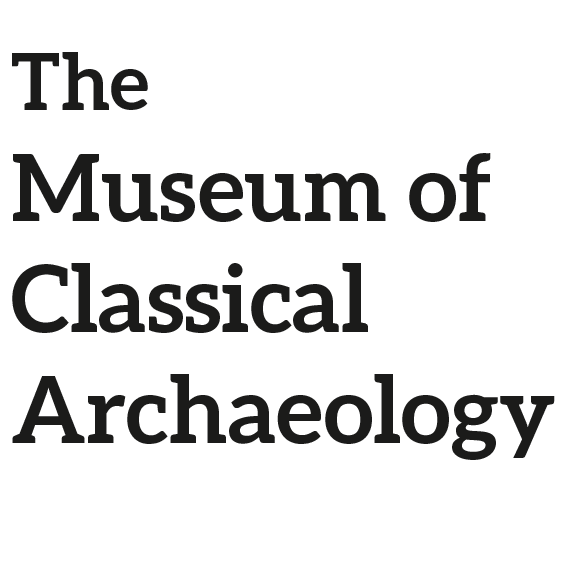
Every cast tells two stories. One ancient. One modern.
Admission is free.
Summer temperatures
We realise the summer has been something of a washout so far - but please note that if the sun is shining, our Cast Gallery (with its glass roof) can get very warm.
Opening hours
Tues-Fri: 10am-5pm Sat ( univ. term-time only ): 2pm-5pm Sun and Monday: Closed
Closed on Bank Holidays
Saturday Opening
Please note: We are open on Saturdays only during University of Cambridge term time .
We are currently closed on Saturdays until Saturday 12 October.
Museum of Classical Archaeology Faculty of Classics Sidgwick Avenue Cambridge CB3 9DA
We do not have an entrance on the road. Find us inside the Sidgwick Site.
Join our mailing list
Subscribe.png.

Get in touch
Tel. +44 (0)1223 330402 Email [email protected]
Find us on social media:
Find-us-on-facebook.png.

find-us-on-twitter.png

instagram_glyph_gradient.png

Copyright statement
All images and material on our websites are ©Museum of Classical Archaeology, University of Cambridge unless otherwise stated. If you would like to reproduce our images , you can now do so for non-commercial use at no charge.
See also our Copyright Notice and Take Down Policy .
UCM-logo.png

Artscouncil.jpg

Museum of Classical Archaeology
Faculty of Classics, Sidgwick Avenue, Cambridge CB3 9DA
Contact: [email protected] Tel: 01223 330402
Further contact link
- Faculty and College contacts
- University Map showing Faculty of Classics
Important Information
Museum of Classical Archaeology Web Accessibility Statement
Copyright Notice and Take Down Policy
© 2024 University of Cambridge
- Contact the University
- Accessibility
- Freedom of information
- Privacy policy and cookies
- Statement on Modern Slavery
- Terms and conditions
- University A-Z
- Undergraduate
- Postgraduate
- Research news
- About research at Cambridge
- Spotlight on...
Find out why teachers and school leaders love PlanBee
- 📚 Cross-Curricular Topics
- ✂️ Design & Technology
- ♻️ Education for Social Responsibility
- 🌍 Geography
- ⛪️ Religious Education
- 🎉 Special Days
- 🦸♀️ Special People
- Vision and Principles
- Our Curriculum Offer
- Curriculum Packs
- FREE teaching resources
- Objective Checker
- How does it work?
Ancient Greece KS2 Lesson Planning and Resources
We've got a comprehensive selection of Ancient Greece KS2 lesson plan packs and free resources to support teaching your KS2 children about the ancient Greek civilisation.
If you would like to know more about this fascinating topic make sure you read our Ancient Greece fact blog and our Olympics fact blog .
Ancient Greece Topic
This fun and engaging KS2 Ancient Greece Topic for Year 5 and Year 6 will take your class back to one of the most fascinating civilisations in hist...
Aesop's Fables
What is a fable? This Aesop's Fables KS2 English lesson pack will help you teach your class what a fable is, and how this particular genre of writi...
Greek Myths
Immerse your class in the wonderful world of Greek gods, mortal heroes and mythical beasts with this Greek Myths KS2 English Pack of reading compre...
Aesop's Fables The Lion and the Mouse
This famous fable is a great way to introduce your class to Aesop - a storyteller from Ancient Greece. Aesop's Fable 'The Lion and the Mouse' teach...
Ancient Greece Brain Teasers
Join the greek gods to solve some challenging Brain Teasers aimed at year 5/6. This slideshow is a great time filler in the classroom and is perfec...
Ancient Greek Gods and Goddesses Posters
These twelve free Ancient Greek Gods and Goddesses KS2 Posters make a perfect display for your History topic! Featuring the following Greek gods an...
Ancient Greek Alphabet for Kids
Download and display this Ancient Greek Alphabet for kids and display in your classroom! It is a great accompaniment to our Ancient Greece Topic.

Ancient Greece Word Search
These two differentiated 'Ancient Greece' word searches are a fun way for your KS2 class to consolidate their Ancient Greek vocabulary as they sear...
Ancient Greece Acrostics
Challenge your class to write their own ancient Greek acrostic poems! This tricky challenge would be a perfect time filler for early finishers of o...
Ancient Greece Timeline KS2 Cards
Download these handy Ancient Greek Timeline KS2 Cards to support your class in understanding the chronology of the ancient Greek civilisation. Use ...
Ancient Greek Shield Designs
This set of free Ancient Greek shield designs sheets includes photos of real Greek shields as well as colouring and design challenges. It is a grea...
Athens and Sparta KS2 Comparison Chart
Explore the differences between the ancient Greek city states of Athens and Sparta with this FREE Athens and Sparta KS2 Comparison Chart. Find out ...
Greek Gods Crosswords
Try these 3 differentiated 'Greek Gods' crossword puzzles to help your class find out about the deities of ancient Greece. Your class will learn th...
Greek Vases KS2 Picture Cards
This Greek Vases KS2 Picture Cards FreeBee is a great resource to complement your Ancient Greece topic. Use as part of a display, as the inspiratio...
Greek Masks KS2 Display Cards
These Greek Masks KS2 Display Cards are the perfect accompaniment to any topic about Ancient Greece. Take a look at our Ancient Greece Topic for Ye...
Greek Mask Template
Download these two Greek Mask Templates for your class to make their own versions of the comedy and tragedy face masks that were used in Greek thea...
Greek Vase Template
Use these Greek Vase Templates to encourage your class to use their creative skills to design their own patterns and images suitable for an ancient...
Hercules Activity Sheets
Add an educational slant to film-watching with these fun Hercules Activity Sheets! Whilst watching the film, children are encouraged to note down a...
- Best selling
- Alphabetically, A-Z
- Alphabetically, Z-A
- Price, low to high
- Price, high to low
- Date, old to new
- Date, new to old
Added to your cart:
What's Your Email?
Liquid error (snippets/flits_custom_snippet line 48): Array 'customer.orders' is not paginateable.
Let customers speak for us
A good power point full of information and photos.
Thanks Kate - we hope you enjoy using the resources!
I have been using Plan Bee for years,however this monthly subscription is great! Access to everything and loving just looking at the amazing activities and planning. Saves me so much time
We are so pleased to hear that you are finding your subscription helpful and time-saving, Michelle! Thank you for taking the time to leave us a review :-)
Ray's Review.
Thanks, Ray!
Very cute! Perfect for an introduction.
We're pleased you like the resource, Theresa!
Diwali Pictures Pack
Thanks, Jayne!
Dan Tastic Education
Workshops & Wow Days
Ancient Greece
Ancient Greece Workshop?
Ancient Greece can come to life in your classroom!
Is your Key Stage Two class learning about Ancient Greece?
Looking for a relevant Ancient Greece Workshop for your KS2 class?
Need an Ancient Greece topic hook for your pupils?
Dan Tastic Education can bring Ancient Greece to life!
Offering an Ancient Greece Workshop, which will bring history to life and spark a love for learning, don’t miss your chance to book one of the most exciting education workshop facilitators in the UK!
Ancient Greece Workshop & Wow Day Topics Covered
Life in 500BCE The History of Greece Greek Gods & Temples Monsters, Myths & Legends Childhood In Ancient Greece Heracles v Hercules Food, Feasts & Drink Handling Historical Weapons & Artefacts
Creative Thinking
We will lead the class in brainstorming different ideas, issues they feel strongly about and changes in society since Ancient Greece.
Having pupils use their imagination & listening skills to engage with the many topics covered in an Ancient Greece Wow Day.
Handling Artefacts
Your class will have the opportunity to touch, hold & handle different Ancient Egyptian artefacts, items & weapons
Booking an Ancient Greece Wow Day with Dan Tastic Education will bring fun and excitement into your class, leaving your students with a new reinvigorated love for education!
Dan Tastic Education Workshops & Wow Days are the perfect Topic Hook for Ancient Greece!
Using historically accurate items, props, video presentations, teacher in role style activities and group discussions we teach children all about Ancient Greece whilst also touching on topics and themes relating to PSHE, Wellbeing, English, Maths, citizenship & inclusivity.
Our Workshops & Wow Days can be delivered right in the classroom, saving the hassle & cost of booking a coach. As we can split the day between a year group, key stage or even the entire school you will find that we are excellent value for money!
Click Here to book your own Ancient Greece Workshop today!
Dan Tastic Education was fantastic, the children were 100% engaged for 100% of the time. The Greek experience day was amazing, it was fun, fact-packed and hands-on. I would highly recommend Dan Tastic Education to anyone.
St Mary’s Catholic Primary Chesterfield, Derbyshire Dan Tastic Education were excellent - highly recommended. Great with our children, kept them engaged and they learned at lot about Ancient Greece. Thank you!
Great North Museum: Hancock
Managed by Tyne & Wear Archives & Museums on behalf of Newcastle University
- What's on
- Telephone: 0191 2086765
Ancient Greece
How can a museum visit support learning for this topic.
The galleries that link to this topic are:
The Ancient Greece gallery, where you can explore objects from pottery to statues. This gives pupils a glimpse into what life was like in ancient Greece for men and women, soldiers, sailors, poets and athletes, free and enslaved people.
We have workshops (led by museum staff) and bookable resources (to support you during school-led time in the galleries) for this topic. We also have printable activities that you can use in school-led time.
How much will a visit cost?
School-led visits and workshops are free.
The only activity in the museum that incurs a cost is visiting the planetarium.
The price for a planetarium showing starts at £37, with some discounts available. Find more information on the planetarium, including detailed prices, show information and trailers here.
When can we visit, and how do we make a booking enquiry?
If you would like a workshop as part of your day: Tuesdays and Fridays in term-time.
If you don’t want to book a workshop, and want to be self-led in the galleries: We can typically accommodate you on a term-time date of your choice. Please still book with us so we can organise coat and bag storage, a lunch space, and greeting you on arrival.
To make a booking enquiry, click the link below.
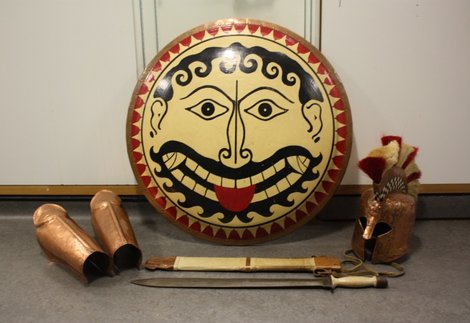
Greek Fighting Forces
Workshop aimed at KS2
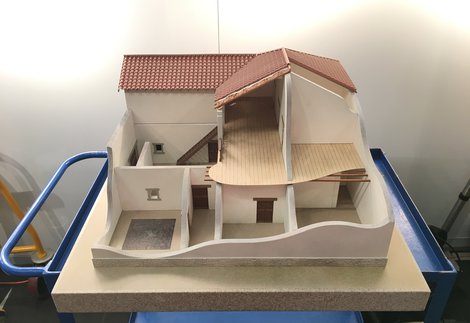
Ancient Greek Hidden Lives; Women and Children
Workshop aimed at KS2 & KS3
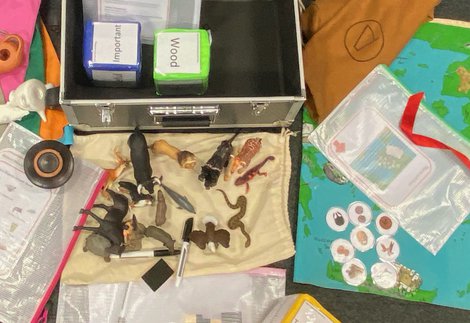
Ancient Greece - Gallery Explorer Kit
Aimed at KS2

Download printable activities
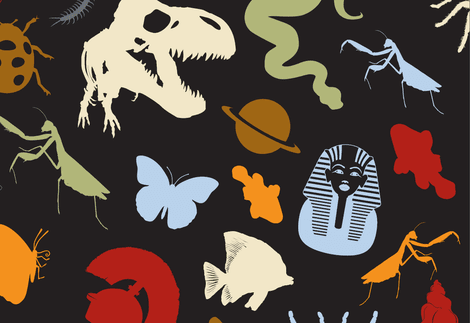
Museum Adventurer kit
A versatile resource to use across all museum galleries.
Download contents

23/24: Make a booking enquiry
Click to fill in our enquiry form for a visit between September 2023 - August 2024.
Enquire now
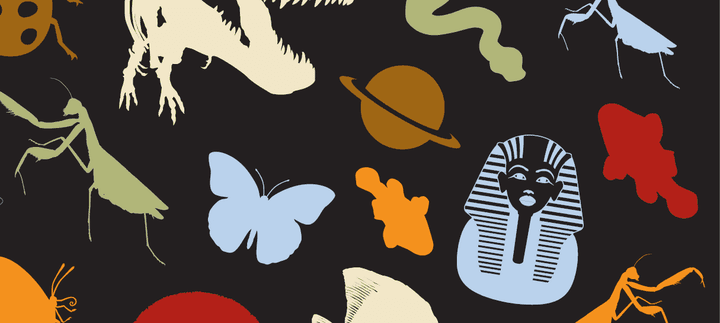
24/25: Make a booking enquiry
Click to fill in our enquiry form for visits between September 2024 - August 2025.
Need more information?
We've provided some hints and tips below, including how to get in touch.

Accessibility
Click for information specific to the learning programme.

Practicalities
Click for information about visiting with a school or group.

Click for ways to get in touch with the Learning Team.

Using this site
Quick links.

Select which cookies to allow:
Cookie Choice - Essential - Used to store your cookie selection for 90 days
Session - Optional - Used to improve your experience and store your preferences
Analytics - Optional - Used to anonymously track user metrics and activity
We use cookies to enable some functionality and track anonymous usage data.
Find out more via our privacy policy and cookie notice.
Accept All Accept All --> Let me choose

How we use cookies
We use cookies to offer you a better experience and understand how our website is being used. Read our Privacy Policy for more information.
Ancient Greeks

Original and replica objects illustrating life in Ancient Greece, resource contains recipes and information cards on themes including drama, language and costume, plus timeline, activities and information for each object.
Box includes Aryballos oil flask and lamp; domestic plate and bowls; coins; cosmetic bowl; Skyphos cup and Oinochoe jug.
Resource meets National Curriculum requirements in History –
KS1 Events beyond living memory significant nationally or globally
KS2 Ancient Greece: study of Greek life and achievements and influence on the western world
KS3 Study of a significant society or issue in world history and interconnections with world developments
Activity pack meets National Curriculum requirement for English, Art and Design, Geography and Drama, Key Stage 1 – 3.
Discover more?
To find out more about this school resource box, download the PDF.
Get in touch
For more information or to make a booking call 0115 876 1420 or email our team at [email protected] .

Access Artefacts | Digital Resources | History | Literature | Nottingham Slave Trade Legacies | Projects
A glossary of terminology for understanding transatlantic slavery and ‘race’.
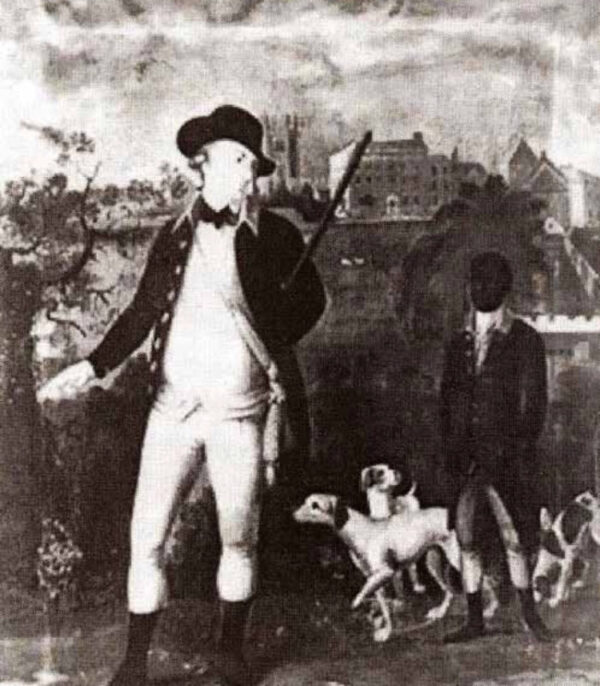
Access Artefacts | Digital Resources | History | Nottingham Slave Trade Legacies | Projects
Leaders in the community: george africanus, keep in touch, sign up to our newsletter.
Get the latest from Nottingham Museums straight to your inbox.
- Member Login

- World Around Us
Search Teaching Cave
Ancient Greece

Interactive Map
This is an interactive resource that highlights the different regions and notable places within Ancient Greece.
Your children can select a icon on the map and learn more about that particular place.
This is a super resource that allows your children to learn key terms and information about the Ancient Greek civilisation.

This resource highlights the key events in the Ancient Greek civilisation.
It gives key date to the Persian and Peloponnesian Wars, Inventions, Kings and Leaders and the Romans.
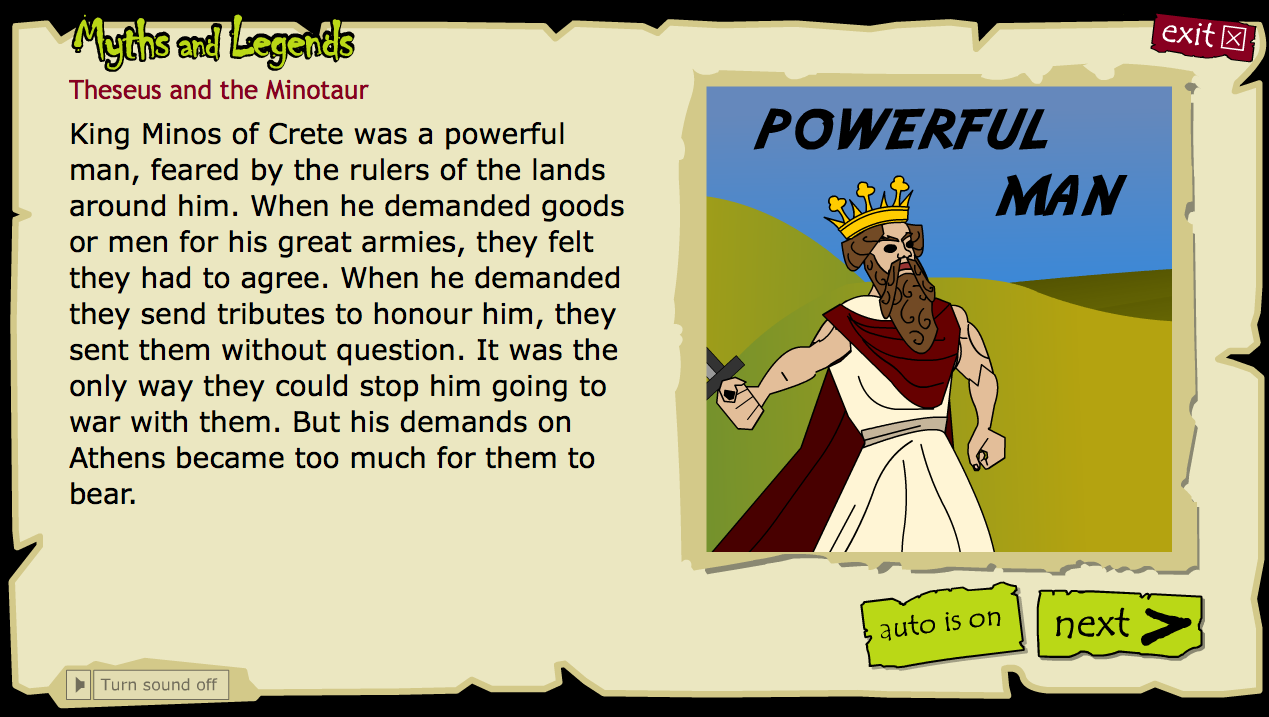
Myths and Legends
Check out our Myths and Legends page linked to Ancient Greece. These resource include stories, animations and video clips for your children to grasp some key myths and characters.

Peloponnesian War
Q: How do Ancient Greeks want to be remembered?
In Ancient Greece, Athens and Sparta were the most powerful and influential Greek city-states. At this time, the leader of the Athenians was Pericles. As Xerxes and his Persian army retreated, Athens grew more powerful and tensions rose, escalating into nearly three decades of war. Sparta emerged victorious, while the constant fighting left Athens bankrupt, exhausted and demoralized. Neither city-state regained the military strength they once had.
A: Ancient Greeks want to be remembered as brave warriors and heroes. Most notably, the Spartans.

Ancient Greek Stories
This is a collection of ancient greek stories. The stories are read to your children which is a great listening exercise. The resource explores stories of
- 1: Persephone and Hades
- 2: Orpheus and Eurydice
- 3: Theseus and the Minotaur
- 4: King Midas and the golden touch
- 5: Perseus and the Gorgon Medusa
- 6: Odysseus and the Trojan Horse
- 7: Odysseus and the Cyclops
- 8: Odysseus and Penelope
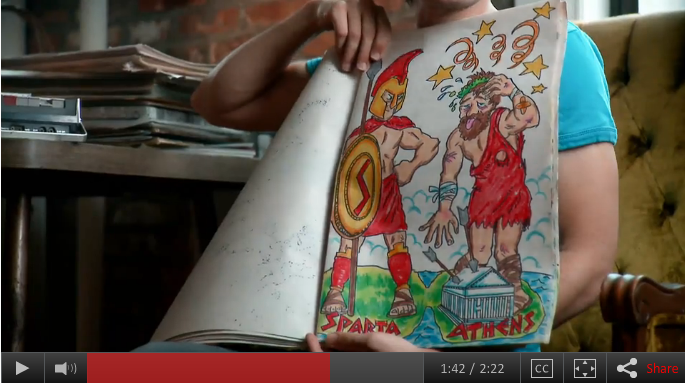
Peloponnesian War - Video Clip
This video clip is a fantastic overview of the Peloponnesian War. The story is read/sang by a musician and artist which makes an interesting watch.
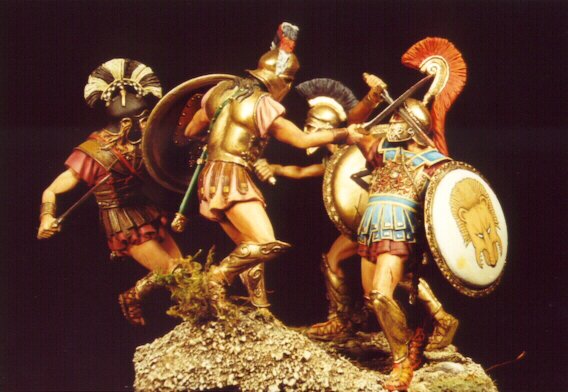
Spartans and Athenians
The Spartan and Athenian civilisations were both very different in their cultures. Spartans were fundamentally professional soldiers, which differs immensely from Athenians, who boast the birthplace of the educational classroom. The list of key figures each left behind as a legacy: Spartans are remembered for Leonidas and the 300, Athenians boast key figures of a varying nature, from Socrates (philosopher and teacher) to Alexander the Great (created one of the largest empire in ancient history).
Athens was the most developed city in Greece, having introduced laws, formal education, sport, democracy and politics. However it has to be noted that in contrast to Spartans, these areas mattered most to Athenians.
Spartans were illiterate (for the most part), they were educated in the art of war, and seeing as how slaves outnumbered the Spartans 10:1 this is hardly surprising. Due to “in-house” wars constantly unfolding in Sparta, the idea of expansion to new lands was not a dream of Spartans.
It could be argued that Athens was a city before its time in many respects due to its multi-dimensional cultural and political achievements. Other than the marginally increased prestige of women in comparison to other Greek cities, Sparta arguably is famous on a more one dimensional level, Fighting.
In any case, both cities achieved in abundance, and although very different, both landmark their place in history.
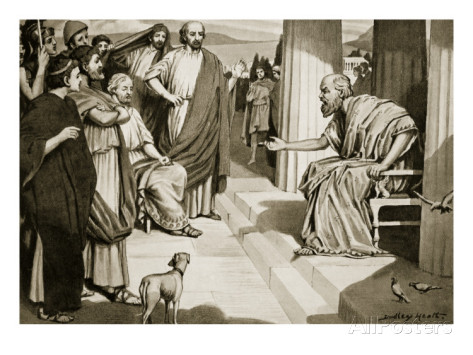
Athens and Athenians
Athens was the largest city in Greece, and controlled a region called Attica. Between the many mountains were fertile valleys, with many farms. Athens became rich because Attica also had valuable sources of silver, lead and marble. Athens also had the biggest navy in Greece.
Athens was a beautiful and busy city. People came to the city from all over Greece, and from other countries, to study and to trade. The city’s most famous building was the temple called the Parthenon. It stood on a rocky hill called the Acropolis. Inside the Parthenon stood a statue of the city’s protector-goddess Athena.
To learn more about Athens click here
This PowerPoint explores the nature of the Athenians (the people who lived in Athens). It mentions a few key Athenians, how the city was named, myths, key buildings which gives an insight to the city and culture at that time.

The Olympics
Another great interactive resource that highlights the different events of the Ancient Olympics.
Each event has a short description and the children can also take part in fun activities and a quiz once they have finished.
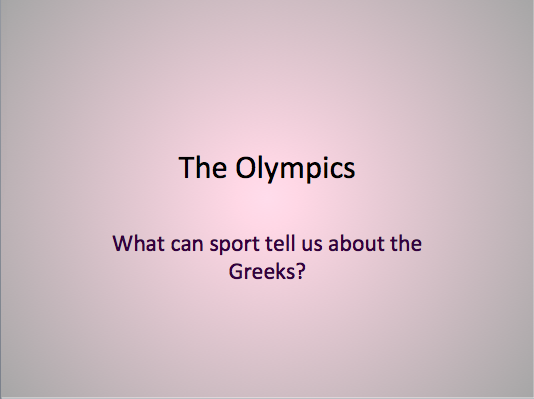
The Ancient Olympics
This PowerPoint explores the origins of the games, Zeus, competitors, judges and more.
The first Olympics had only the footrace. Over time longer races and new events were added. The games were held at Olympia, in the Peloponnesus, on the site of a major temple. The aim of the games was to honour Zeus.
Quick Facts:
- Greeks came from all over the Mediterranean to compete in the games.
- A truce was declared a month before the games to allow people to travel. This meant wars and battles were postponed.
A: They want to be remembered as being athletic, powerful, strong and most importantly, as winners.
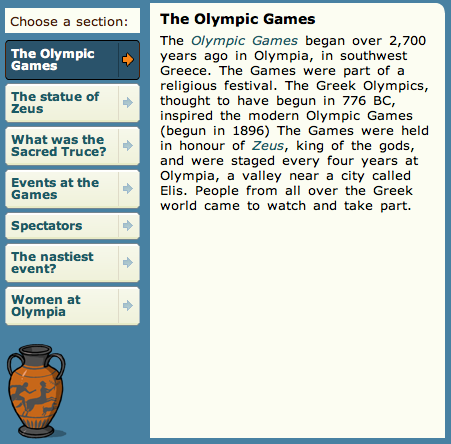
Olympic Games
The Olympic Games originated over 2,700 years ago in Olympia, a location in southwest Greece. The Games were part of a religious festival and people from all over the Greek world came to watch and take part. The Greek Olympics, thought to have begun in 776 BC, inspired the modern Olympic Games, which was introduced by Pierre de Coubertin in 1896. The Games were held in honour of Zeus, king of the gods, and were staged every four years at Olympia, a valley near a city called Elis.
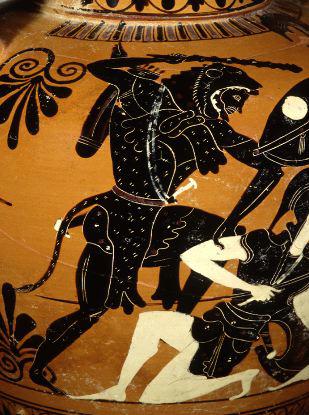
Milo of Kroton
One of the most legendary athletes in the ancient world, Milo of Kroton, wore the victor’s crown at Olympia no less than six times. Born in southern Italy, where Greece had many colonies, Milo won the boys’ wrestling contest in 540 BCE.
He returned eight years later to win the first of five consecutive wrestling titles, a feat that seems incredible by modern standards. Rarely do modern-day Olympians compete in more than two or three Olympiads over the course of a career. Much like the boxer George Foreman, Milo resisted retirement: By the time of the 67th Olympiad in 512 BCE, Milo was probably forty or more years old but he competed anyhow. The challenger won not by overpowering Milo, but by avoiding the older wrestler and wearing him out.
According to our ancient sources, Milo enjoyed showing off his unrivaled strength. For instance, he would clasp a pomegranate in his hand and have others try to take it away from him. Even though he was holding it so tightly that no one could remove it, he never damaged the fruit. Sometimes, he would stand on a greased iron disk and challenge others to push him off of it. Another of his favorite exhibitions was tying a cord around his forehead, holding his breath, and breaking the cord with his bulging forehead veins. Other times, the wrestler would stand with his right arm at his side, his elbow against him, and hold out his hand with thumb pointed upwards and fingers spread. No one could successfully bend even his little finger.
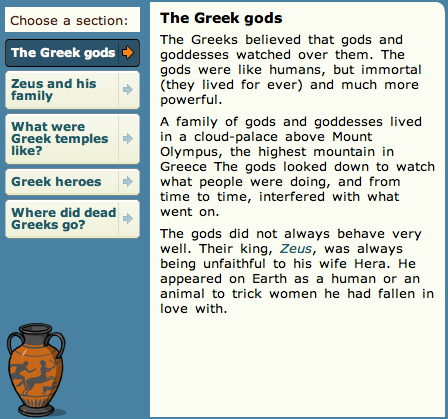
Greeks and Gods
The Ancient Greeks believed that gods and goddesses watched over them. There were many popular gods and goddesses during this time. The gods were believed to be immortal and powerful beyond measure. So powerful that they could control the weather.
Just like the Christian God’s heaven, a family of gods and goddesses lived in a cloud-palace above Mount Olympus. Mountain Olympus was the highest mountain in Greece. The gods looked down to watch what people were doing, and from time to time, interfered with what went on.
A list of Gods:
Zeus was king of the gods. He threw thunderbolts to punish anyone who disobeyed him. His brother Poseidon was god of the sea. Another brother, Pluto (also called Hades), ruled the underworld.
Apollo (Zeus’s son) was the sun god, and the god of the arts, medicine, music and poetry.
Artemis (Apollo’s twin sister) was goddess of the moon, and goddess of childbirth, and of all natural things. She is often shown as a hunter with a bow and arrow.
Athena was goddess of wisdom, and of crafts such as spinning, weaving and pottery.
Ares was the bad-tempered god of war.
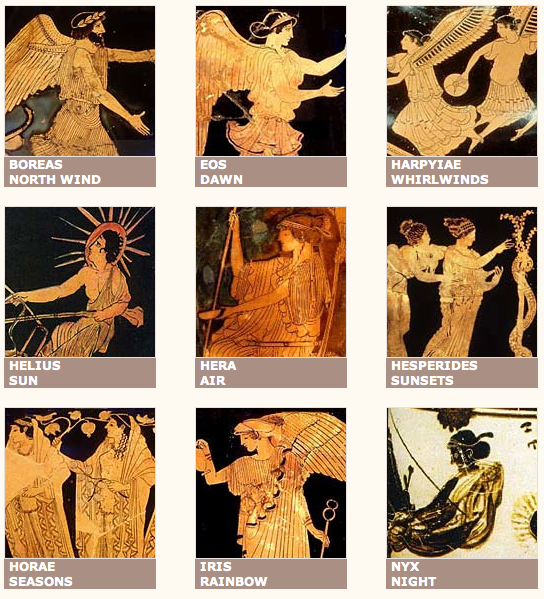
Weather Gods
This resource is all about the different gods of weather.
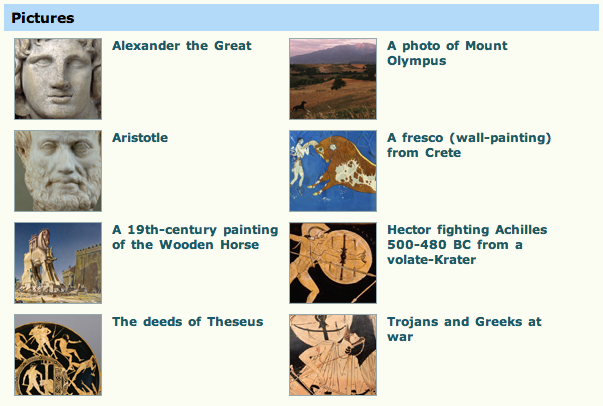
Picture Sources
This link guides you to a variety of resources relating to Ancient Greece.

Alexander the Great
Alexander, known as the Great Greek, was not Greek. He was a Macedonian prince. Macedonia was an empire located to the north of Greece.
Alexander had many teachers, one of which was Aristotle. Aristotle was also born in Macedonia. However, Aristotle lived in Greece for a really long time. He loved the Greeks. He believed in the Greek gods. He knew Greek history and the Greek language and Greek theatre. Aristotle thought the Greeks were clever and interesting and talented, and he spoke of his admiration for the Greeks many times to his student, the young prince, Alexander.
To learn more click the image.

10 Facts about Ancient Greece
Explore 10 informative facts about Ancient Greece in bite size chunks. The facts enlighten the reader, giving them an insight to life in Ancient Greece and Greek Culture.
©2024 TeachingCave.com Contact: [email protected]
- 0 Shopping Cart £ 0.00 -->
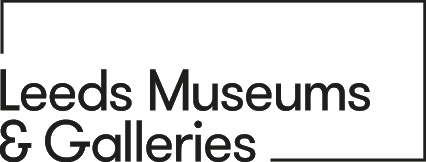
Ancient Worlds: Greeks
This popular workshop delves into our archaeology collections. Transport your class to Ancient Greece. Immerse yourselves in the achievements of this civilization by coming face-to-face with surviving Ancient Greek pottery and riches. Handle real ancient artefacts, investigate mystery finds and design a myth.
ABBEY HOUSE MUSEUM
Opening Hours
Mon: closed Tues – Fri: 10am – 5pm Sat: 12 – 5pm Sun: 10am – 5pm Last admission: 4.30pm
Plan your visit
Abbey Walk Kirkstall Leeds LS5 3EH
Ticket Provider

Get directions with Google Maps
Stay connected. Sign up to receive email updates on our exhibitions, events, and more.
Facebook of Abbey House Museum Instagram of Leeds Museums and Galleries Twitter of Leeds Museums and Galleries Youtube of Leeds Museums and Galleries
LEEDS ART GALLERY
Mon: Closed Tues -Sat: 10am – 5pm Sun: 11am – 3pm
The Headrow Leeds LS1 3AA
Facebook of Leeds Art Gallery Instagram of Leeds Art Gallery Twitter of Leeds Art Gallery Youtube of Leeds Art Gallery
LEEDS CITY MUSEUM
Mon: closed (11am – 5pm on bank holidays) Tues – Fri: 10am – 5pm Sat & Sun: 11am – 5pm
Leeds City Museum Millennium Square Leeds LS2 8BH

Facebook of Leeds City Museum Instagram of Leeds City Museum Twitter of Leeds City Museum Youtube of Leeds Museums and Galleries
LEEDS DISCOVERY CENTRE
Visits by appointment/special event only.
Free public store tours are now available by booking in advance. Please call or email us.
Leeds Discovery Centre Off Carlisle Road Leeds LS10 1LB
Facebook of Leeds Discovery Centre Instagram of Leeds Museums and Galleries Twitter of Leeds Museums and Galleries Youtube of Leeds Museums and Galleries
LEEDS INDUSTRIAL MUSEUM
Mon: Closed (10am – 5pm on bank holiday Mondays )
Tues – Fri: 10am – 5pm
Sat – Sun: 12 – 5pm
Last admission one hour before closing.
Canal Road Leeds LS12 2QF
Facebook of Leeds Industrial Museum Instagram of Leeds Museums and Galleries Twitter of Leeds Museums and Galleries Youtube of Leeds Museums and Galleries
KIRKSTALL ABBEY
Mon: closed (10am – 4pm on bank holidays) Tues – Sun: 10am – 4.30pm Last admission: 4pm
Abbey Road Kirkstall Leeds LS5 3EH
Facebook of Kirkstall Abbey Instagram of Leeds Museums and Galleries Twitter of Leeds Museums and Galleries Youtube of Leeds Museums and Galleries
Estate opens: 7.30am Café: 9am – 5pm, hot food finishes 45 mins before Hall: Open (Downstairs only) 10am-5pm Wildlife World: 10am – 5pm Estate closes: 7pm Last entry 45 mins before estate closing time
Lotherton Lane Aberford Leeds LS25 3EB
Facebook of Lotherton Instagram of Lotherton Twitter of Lotherton Youtube of Leeds Museums and Galleries
TEMPLE NEWSAM
House: Tues – Sun: 10.30am – 5pm Home Farm: Tues – Sun: 10am – 5pm | Open Bank Holiday Mondays and throughout summer holidays Last entry 45 minutes before
Temple Newsam Road Leeds LS15 0AE
Facebook of Temple Newsam Instagram of Temple Newsam Twitter of Temple Newsam Youtube of Temple Newsam
THWAITE WATERMILL
Thwaite Lane Stourton Leeds LS10 1RP
Facebook of Thwaite Watermill Instagram of Leeds Museums and Galleries Twitter of Leeds Museums and Galleries Youtube of Leeds Museums and Galleries
LOGOS, FOOTER LINKS, COPYRIGHT

Cookies - We use cookies to help improve your experience of using our website. For more information about the cookies we use, see Leeds City Council’s privacy page . You can change your cookie settings at any time by following the instructions on our cookies page .
Cookie and Privacy Settings
We may request cookies to be set on your device. We use cookies to let us know when you visit our websites, how you interact with us, to enrich your user experience, and to customize your relationship with our website.
Click on the different category headings to find out more. You can also change some of your preferences. Note that blocking some types of cookies may impact your experience on our websites and the services we are able to offer.
These cookies are strictly necessary to provide you with services available through our website and to use some of its features.
Because these cookies are strictly necessary to deliver the website, refusing them will have impact how our site functions. You always can block or delete cookies by changing your browser settings and force blocking all cookies on this website. But this will always prompt you to accept/refuse cookies when revisiting our site.
We fully respect if you want to refuse cookies but to avoid asking you again and again kindly allow us to store a cookie for that. You are free to opt out any time or opt in for other cookies to get a better experience. If you refuse cookies we will remove all set cookies in our domain.
We provide you with a list of stored cookies on your computer in our domain so you can check what we stored. Due to security reasons we are not able to show or modify cookies from other domains. You can check these in your browser security settings.
These cookies collect information that is used either in aggregate form to help us understand how our website is being used or how effective our marketing campaigns are, or to help us customize our website and application for you in order to enhance your experience.
If you do not want that we track your visit to our site you can disable tracking in your browser here:
We also use different external services like Google Webfonts, Google Maps, and external Video providers. Since these providers may collect personal data like your IP address we allow you to block them here. Please be aware that this might heavily reduce the functionality and appearance of our site. Changes will take effect once you reload the page.
Google Webfont Settings:
Google Map Settings:
Google reCaptcha Settings:
Vimeo and Youtube video embeds:
The following cookies are also needed - You can choose if you want to allow them:
You can read about our cookies and privacy settings in detail on our Privacy Policy Page.

Ancient Greece!
The Past Presents School Workshop
School Workshops History Greeks Ancient Civilisations KS1 to KS2
Why book 'Ancient Greece!' with The Past Presents

What activities are available during this educational workshop?
Which curriculum subjects do you cater for, greeks [click to read].
Curriculum topics available: Greek life and achievements, Greek influence on the western world, Pythagoras and Aristotle, Religion Trade Politics and Architecture.
Ancient Civilisations [click to read]
Curriculum topics available: Ancient Greeks.
What size groups do you cater for?
Do you offer access for visitors with disabilities, do you cater for visitors with special educational needs (sen).
Yes absolutely. We currently work in partnership with a local SEN school so we are experienced in delivering to all levels.
This content is hosted by YouTube. By watching this video, your browser will receive cookies from youtube.com
Who are The Past Presents?
At The Past Presents we combine our years of experience teaching young people with our unrivalled equipment, resources & activities to bring to you the wonderment of the past. Our passion is to provide an evolving, ever-improving vehicle for learning which we can use to spark in your young people an interest in History. It is also important to us that we use these wondrous vehicles for learning to communicate one of the key reasons for studying History....that understanding the past helps us understand who we are and where we are going.
Find out more about this school workshop...
Pages people also viewed
Teachers interested in this The Past Presents workshop also viewed the learning experiences below.
We are bursting with ideas on places that deliver first class teaching both outside the classroom and as in-school workshops. Feel free to use our tailor-made trip form and we can help you find the perfect experience for your class!

Ancient Greeks

Life in Ancient Greece Day

The Ancient Greeks: Athens & the Battle of Marathon 490 BC
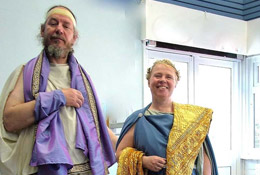
Get school trip offers by email
Unsubscribe at any time, we won't share your email with anyone else, just send you all the best offers and inspiration for your next class trip!

Join us on Social Media
© 2024 PlanMySchoolTrip
Why not share your opinion with fellow teachers by reviewing? Please only submit a review of Ancient-Greece! if you have visited this place during a school trip:

IMAGES
COMMENTS
Storytelling with the Greeks KS2 - Students will explore continuity and change and compare life in Ancient Greece to the present day, as well as looking at the legacy of Greek culture on art and literature.
Key Stage 2: Ancient Greeks (In Person) Book this workshop and discover the world of ancient Greece. Our atmospheric Cast Gallery is the perfect space to explore the gods and heroes from myth, and to learn about ancient Greek culture and life. Age: 7-11 (KS2)
Key Stage 2: Ancient Greece. Discover the culture and civilisation of the ancient Greeks. Explore what life in the city states of classical Greece was like and the role of religion in shaping how the Greeks saw themselves and their world. Find out what it meant to be a citizen of classical Athens, the sporting events of the ancient Olympic ...
Interactive learning for KS1, KS2 and KS3 Ancient Greece was full of great thinkers, poets, scientists, mathematicians and a dazzling array of deities with Zeus at the top of the Senior Management Team on Mount Olympus.
The morning workshop consists of a short introduction to Greek life and culture, followed by four engaging activities: A Greek quiz, with loads of fun Greek facts for the children to discover. Archimedes' Stomachion - the oldest known mathematical puzzle. Petteia, the Greek strategy game. Myths and legends - the children are transported ...
Why book 'Ancient Greeks' with Ufton Court for School Trips and Educational Visits? Your group will become members of the nouveau riche mercantile classes and learn all about the key aspects of Greek life from trade, to education and importantly all about the military power. Travel through the Ancient Greek world, discovering the culture and lifestyles which make all states unique.
For further details on our KS2 Ancient Greeks workshop, pricing and availability call us now on call us now on 0800 112 3192, email us or fill out the form below: Contact Info. Message. Covering everything from the warring city states, the birth of democracy and Greek legends to Alexander the Great and Greek culture, our warriors make...
Our KS2 Ancient Greece History Unit offers a comprehensive exploration of this captivating civilization. Each lesson thoughtfully combines discussions, interactive activities, and presentations, fostering a solid understanding of Ancient Greek culture.
The Ancient Greeks believed in 12 major gods and goddesses who lived on Mount Olympus. Greek Gods were associated with different things, e.g. Hera, Queen of the Gods, was associated with marriage and family. The popular myth of Persephone and the Underworld shows us how the Ancient Greeks explained the change of the seasons.
KS2 Ancient Greeks Covering everything from the warring city states, the birth of democracy and Greek legends to Alexander the Great and Greek culture.
Learn about Ancient Greeks with the Museum of Classical Archaeology The Museum of Classical Archaeology loves helping children and adults to learn about the Ancient Greeks. We have put together a range of activities aimed at primary school children. They are easily adaptable to other ages too.
What we know about Ancient Greece I can write an account of Ancient Greek history and culture which which best represents what Ancient Greece was like.
Greece was one of the most influential civilisations in history for the sciences, medicine, maths, philosophy and the arts. Children will get a real feel for the world in the time of the Ancient Greeks through a wide range of activities and authentically made replica artefacts. Our costumed workshop leaders giving you a day full of fun ...
Discover a selection of the best Ancient Greek activities for KS2 including lesson planning packs and free resources, for teaching about ancient Greece.
Dan Tastic Education can bring Ancient Greece to life! Offering an Ancient Greece Workshop, which will bring history to life and spark a love for learning, don't miss your chance to book one of the most exciting education workshop facilitators in the UK! Creative Thinking. We will lead the class in brainstorming different ideas, issues they ...
The Ancient Greece gallery, where you can explore objects from pottery to statues. This gives pupils a glimpse into what life was like in ancient Greece for men and women, soldiers, sailors, poets and athletes, free and enslaved people. We have workshops (led by museum staff) and bookable resources (to support you during school-led time in the ...
Ancient Greece: study of Greek life and achievements and influence on the western world. Study of a significant society or issue in world history and interconnections with world developments. Activity pack meets National Curriculum requirement for English, Art and Design, Geography and Drama, Key Stage 1 - 3. To find out more about this ...
Check out all our resources for teaching about Ancient Greece to Year 3, Year 4, Year 5 and Year 6.
Discover the wonders of Ancient Greece, through the antiquities collection at World Museum and the paintings and sculpture at the Walker Art Gallery.
The Drama Hut specialise in bringing on-site and online workshops directly to your school, covering a wide range of curricular topics. Through drama, improvisation and role play let us create a unique learning experience for your school! Trips for primary history ancient civilisations topics Shang Dynasty China, Ancient Sumer, Mayas Indus Valley.
This popular workshop delves into our archaeology collections. Transport your class to Ancient Greece. Immerse yourselves in the achievements of this civilization by coming face-to-face with surviving Ancient Greek pottery and riches. Handle real ancient artefacts, investigate mystery finds and design a myth. Tags: Ancient Greeks, KS2, Leeds City Museum English Join the conversation Our venues ...
Gods, Gorgons & Gryphons - The Myths and Legends of Ancient Greece are brought to life using role play & drama in this weird and wonderful session where ancient greek gods parade on the catwalk and young people peer-teach using the medium of Greek Theatre! Barbaric Battles - One of our most engaging sessions, these follow a structured format of ...